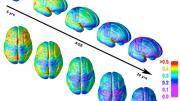Just what is on undergraduates' minds--other than that? Four shelves in the entry hall of Lamont Library, just beyond the circulation desk, give some idea. There reside bound copies of theses awarded the Thomas T. Hoopes Prize for "excellence in undergraduate work and faculty teaching," as the sign says: the drare award that recognizes pupil and professor alike. The volumes from the two most recent graduating College classes, bound in sober brown with gold block lettering, inspire this year's seniors--or reproach the slackers.
The 67 winning entries from the 1999-2000 academic year, whose authors each received $2,500, range from Kevin Robert Amer's "Mirror Images: Community Organizing in Cleveland, Ohio, 1963-1965" (history and literature) to Beini Zhou's "A New Forward-Secure Digital Signature Scheme with a Key-Evolution Paradigm" (applied mathematics).
One hardly knows what Hoopes '19, a curator at the City Art Museum in St. Louis and an expert in firearms, would make of those beneficiaries of his estate's largesse. Perhaps he would feel on firmer ground with Derek Delbert Smith's "The Next Strategic Confrontation: Controlling the Proliferation of Dual-Use Satellite Systems" (government). One cannot easily infer his attitude toward Dasa Pejchar's "Teaching Society in the Classroom: A Study of Early-Childhood Education in China and Japan" (East Asian languages and civilizations) or Katherine Sigelman's "Conversing with Pebbles: Miniature Space in Twentieth-Century Poetry" (literature).
Concerns of the flesh do make an appearance, after all. Patricia L. Santos researched "Selling Sex and Women," which turns out to be an economics paper on "the theory of commodification." And embracing one of Harvard's own, historian of science Robin M. Wasserman wrote "Tuning In"--about Timothy Leary, of course, but also about the limits of experimental psychology. A serious lot, these current-day student scholars."





